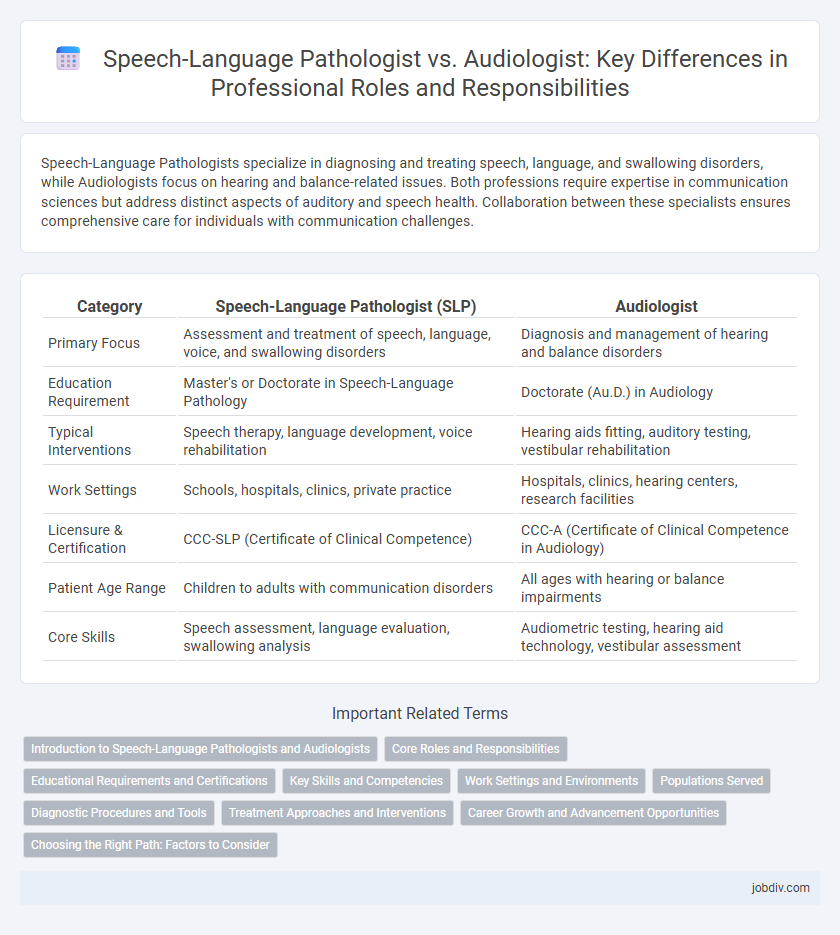Speech-Language Pathologists specialize in diagnosing and treating speech, language, and swallowing disorders, while Audiologists focus on hearing and balance-related issues. Both professions require expertise in communication sciences but address distinct aspects of auditory and speech health. Collaboration between these specialists ensures comprehensive care for individuals with communication challenges.
Table of Comparison
| Category | Speech-Language Pathologist (SLP) | Audiologist |
|---|---|---|
| Primary Focus | Assessment and treatment of speech, language, voice, and swallowing disorders | Diagnosis and management of hearing and balance disorders |
| Education Requirement | Master's or Doctorate in Speech-Language Pathology | Doctorate (Au.D.) in Audiology |
| Typical Interventions | Speech therapy, language development, voice rehabilitation | Hearing aids fitting, auditory testing, vestibular rehabilitation |
| Work Settings | Schools, hospitals, clinics, private practice | Hospitals, clinics, hearing centers, research facilities |
| Licensure & Certification | CCC-SLP (Certificate of Clinical Competence) | CCC-A (Certificate of Clinical Competence in Audiology) |
| Patient Age Range | Children to adults with communication disorders | All ages with hearing or balance impairments |
| Core Skills | Speech assessment, language evaluation, swallowing analysis | Audiometric testing, hearing aid technology, vestibular assessment |
Introduction to Speech-Language Pathologists and Audiologists
Speech-Language Pathologists (SLPs) specialize in diagnosing and treating communication disorders, including speech, language, voice, and swallowing difficulties, using evidence-based therapeutic techniques. Audiologists focus on identifying, evaluating, and managing hearing and balance disorders through comprehensive audiometric testing and intervention strategies such as hearing aids and cochlear implants. Both professions require specialized graduate education and clinical training to address distinct but overlapping areas of communication health care.
Core Roles and Responsibilities
Speech-language pathologists specialize in diagnosing and treating communication disorders, including speech, language, cognitive-communication, and swallowing difficulties. Audiologists focus on identifying, managing, and preventing hearing and balance disorders through comprehensive auditory evaluations, hearing aids fitting, and auditory rehabilitation. Both professions collaborate with multidisciplinary teams to enhance patient outcomes in communication and auditory health care.
Educational Requirements and Certifications
Speech-Language Pathologists (SLPs) typically require a master's degree in speech-language pathology, completion of a clinical fellowship, and certification from the American Speech-Language-Hearing Association (ASHA) to practice professionally. Audiologists usually need a doctoral degree (Au.D.) in audiology, completion of supervised clinical hours, and state licensure or certification from ASHA or the American Board of Audiology. Both professions demand rigorous educational standards and ongoing continuing education to maintain certification and licensure.
Key Skills and Competencies
Speech-Language Pathologists excel in diagnosing and treating communication disorders, focusing on speech, language, and swallowing difficulties, requiring strong skills in linguistic assessment and therapeutic intervention. Audiologists specialize in hearing and balance disorders, utilizing expertise in audiometric testing, hearing aid fitting, and vestibular rehabilitation. Both professions demand critical competencies in patient communication, diagnostic acumen, and individualized treatment planning within clinical and educational settings.
Work Settings and Environments
Speech-Language Pathologists typically work in diverse settings such as schools, hospitals, rehabilitation centers, and private practices, addressing communication disorders across different age groups. Audiologists are commonly found in medical facilities, clinics, and specialized hearing and balance centers, focusing on diagnosing and treating hearing and vestibular disorders. Both professionals may also collaborate in multidisciplinary teams within educational institutions and healthcare environments to provide comprehensive patient care.
Populations Served
Speech-language pathologists primarily serve individuals with communication disorders, including children with developmental delays and adults recovering from strokes or traumatic brain injuries. Audiologists focus on patients experiencing hearing loss, balance disorders, and auditory processing issues, catering to populations ranging from infants to elderly adults. Both professions collaborate closely to address overlapping concerns in speech and hearing health within diverse clinical and educational settings.
Diagnostic Procedures and Tools
Speech-language pathologists utilize standardized language and speech assessments, such as the Clinical Evaluation of Language Fundamentals (CELF) and the Goldman-Fristoe Test of Articulation, to diagnose communication disorders. Audiologists employ diagnostic tools including audiometers for pure-tone audiometry, tympanometers for middle ear analysis, and otoacoustic emissions (OAEs) testing to evaluate hearing and auditory function. Both professionals apply specialized protocols to accurately identify and differentiate speech, language, and hearing impairments.
Treatment Approaches and Interventions
Speech-Language Pathologists (SLPs) employ evidence-based interventions targeting speech production, language comprehension, cognitive-communication, and swallowing disorders, utilizing techniques such as articulation therapy, language intervention activities, and augmentative communication devices. Audiologists focus on diagnosing and managing hearing and balance disorders through fitting hearing aids, cochlear implants, auditory training, and vestibular rehabilitation. Both professionals collaborate to provide comprehensive care, yet their treatment modalities are distinctly specialized based on communication versus auditory processing needs.
Career Growth and Advancement Opportunities
Speech-Language Pathologists (SLPs) experience robust career growth driven by expanding healthcare needs and educational settings, with advancement opportunities into specialties such as pediatric therapy, neurogenic communication disorders, and administrative roles. Audiologists benefit from increasing demand due to aging populations and technological innovations in hearing aids, with career paths extending into clinical management, research, and auditory implant programming. Both professions offer strong job stability and opportunities for continuing education to specialize further and assume leadership positions in healthcare or educational institutions.
Choosing the Right Path: Factors to Consider
Selecting between a Speech-Language Pathologist and an Audiologist depends on the specific communication or hearing challenges one faces, as speech-language pathologists specialize in diagnosing and treating speech and language disorders, while audiologists focus on hearing assessments and auditory rehabilitation. Considerations include the nature of the impairment, such as speech production issues, language comprehension difficulties, or hearing loss, and the desired outcomes like speech improvement versus hearing aid fitting. Evaluating these factors ensures targeted intervention aligned with individual needs and professional expertise.
Speech-Language Pathologist vs Audiologist Infographic

 jobdiv.com
jobdiv.com